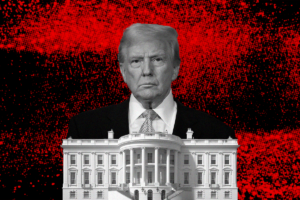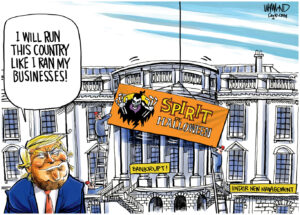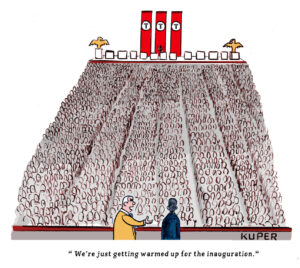The Great White Hope
Tim Walz’s coded racial defiance of MAGA is long overdue. Democratic vice presidential nominee Minnesota Gov. Tim Walz speaks during the Democratic National Convention in Chicago on Aug. 21, 2024. (AP Photo/Paul Sancya)
Democratic vice presidential nominee Minnesota Gov. Tim Walz speaks during the Democratic National Convention in Chicago on Aug. 21, 2024. (AP Photo/Paul Sancya)
Like a lot of people, I breathed a sigh of relief when Kamala Harris chose Minnesota Gov. Tim Walz as her running mate. Heading into the Democratic convention, the vice president trailed Trump among noncollege-educated whites by 13 points, and rural and small-town voters by 17 points. In a compressed-time contest where symbolism carries more weight than usual, Walz was a shrewd choice. He holds a strong appeal to ordinary people in the Rust Belt states that Democrats have long been accused of leaving behind. From the beginning, Walz has proven up to the task, leaning effortlessly into the role of plain-spoken “Midwestern dad in plaid” with a humble but resonant small-town biography.
But electoral college math isn’t the only reason I feel relieved. After eight years of the MAGA movement promoting toxic whiteness in 21st century America, Walz is a pushback that’s long overdue. The racial aspect of Walz’s message is not explicit — for good reasons, it can’t be — but it is unmistakable. When he famously decried the MAGA movement as “weird,” he was talking about more than its obsession with Roe v. Wade, Trump prattling on about Hannibal Lecter or viral stories about JD Vance screwing his couch. He was contrasting it all with a model of white “normality,” defined by decency and inclusion that has been playing defense since the rise of Trump. A campaign highlighting this weird/normal dichotomy is perhaps the loudest reverse dog whistle in the history of modern U.S. politics. It amounts to a rejection of MAGA-coded white identity rooted in racism and nativism, not to mention sexism and unchecked capitalism. In denouncing all of these -isms as “weird,” Walz is planting a flag: none of this behavior is representative of true “heartland” (read as “white” in U.S. politics) values.
Since the civil rights movement, white pols on both sides have avoided talking directly about white racial identity. Joe Biden has described MAGA as driven by fringe extremists or, from another viewpoint, as disaffected mainstream people whose core resentments are economic and spiritual in nature — but never cultural and racial. This public analysis contains a considerable amount of truth: There is justifiable white anger over NAFTA, gutted manufacturing economies, addiction, despair-related deaths. But it is not the whole truth, and it misses a key aspect of MAGA’s appeal. The studious aversion to recognizing the reality of white cultural group identity has not only not stopped Trumpism, it has arguably helped it to thrive. It has given the troubling impression the past eight years that MAGA is white America writ large, with its white critics either too unmotivated or too racially inhibited to mount a counteroffensive.
After eight years of the MAGA movement promoting toxic whiteness in 21st century America, Tim Walz is a pushback that’s long overdue.
Walz is a delayed correction to this failure of nerve, both by Democrats and white folks in general. He has broken through the paralysis by drawing a line between reasonable white people and misguided ones who oppose a diverse democracy, insisting that turning back the clock is, in a word, weird. In casting MAGA whiteness as offensive and out of touch, Walz is embracing an alternative Midwestern ideal: generous, rational, deeply invested in community and, above all, able to “mind your own damn business.” It’s a directive with universal appeal that calls out white intolerance and says, in effect, supremacist thinking of any kind — racial, sexual, personal — is baloney. More than that, Walz suggests, it’s un-American.
To be sure, the moral mythos Walz is using to appeal to “white” America’s conscience — a tightknit and welcoming farming community, experience in the meritocratic military — has often been more aspirational than actual. Heartland states such as Indiana and Illinois have histories of racial repression and violence that rival some Southern states. And it hardly needs to be said that white people don’t have any unique claims to decency; indeed, it’s people of color who’ve done most to keep the mission of democracy alive. Nonetheless, Walz stands firm as a symbol that whites are an integral part of a multiracial, multiconstituency democracy that remains a powerful idea to many, one that should be celebrated and extended, not ridiculed or seen as a threat.
The 2016 election launched a crisis when it exposed to the world the depth and breadth of racial antipathy within the white population that had long been invisible, or ignored. For eight years, Democrats struggled to respond to a metastasizing MAGA cult, to little effect. What the party desperately needed was a political actor on the national stage with the audacity to address the nature of the white crisis, and the biographical-cultural credibility to back it up. At the eleventh hour, Walz has emerged as that actor, a compelling heartland figure who stubbornly refuses to give up his place in a compassionate vision of the country and says nobody else should, either. It’s past time, he seems to be saying, to fight for our true selves and do so without apology. In an election that will be won by inches, Walz’s championing the better angels of working-class whites just may win the decisive bit of territory the Democrats need to get over.
Your support is crucial…With an uncertain future and a new administration casting doubt on press freedoms, the danger is clear: The truth is at risk.
Now is the time to give. Your tax-deductible support allows us to dig deeper, delivering fearless investigative reporting and analysis that exposes what’s really happening — without compromise.
Stand with our courageous journalists. Donate today to protect a free press, uphold democracy and unearth untold stories.









You need to be a supporter to comment.
There are currently no responses to this article.
Be the first to respond.